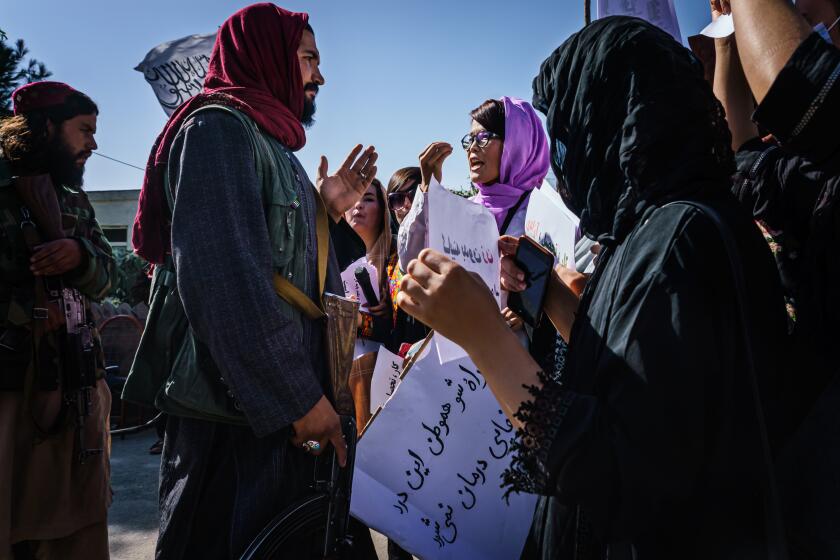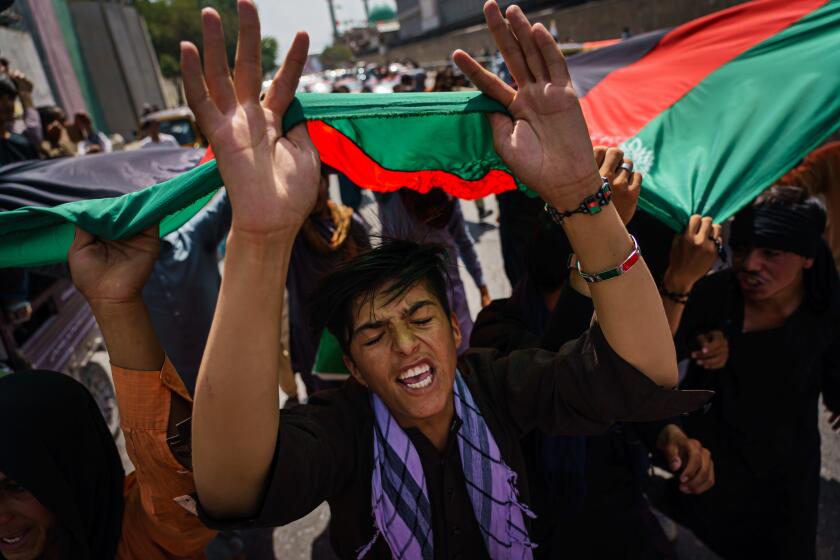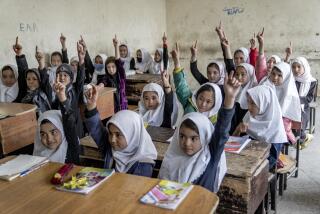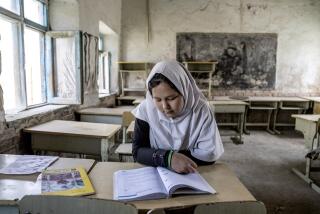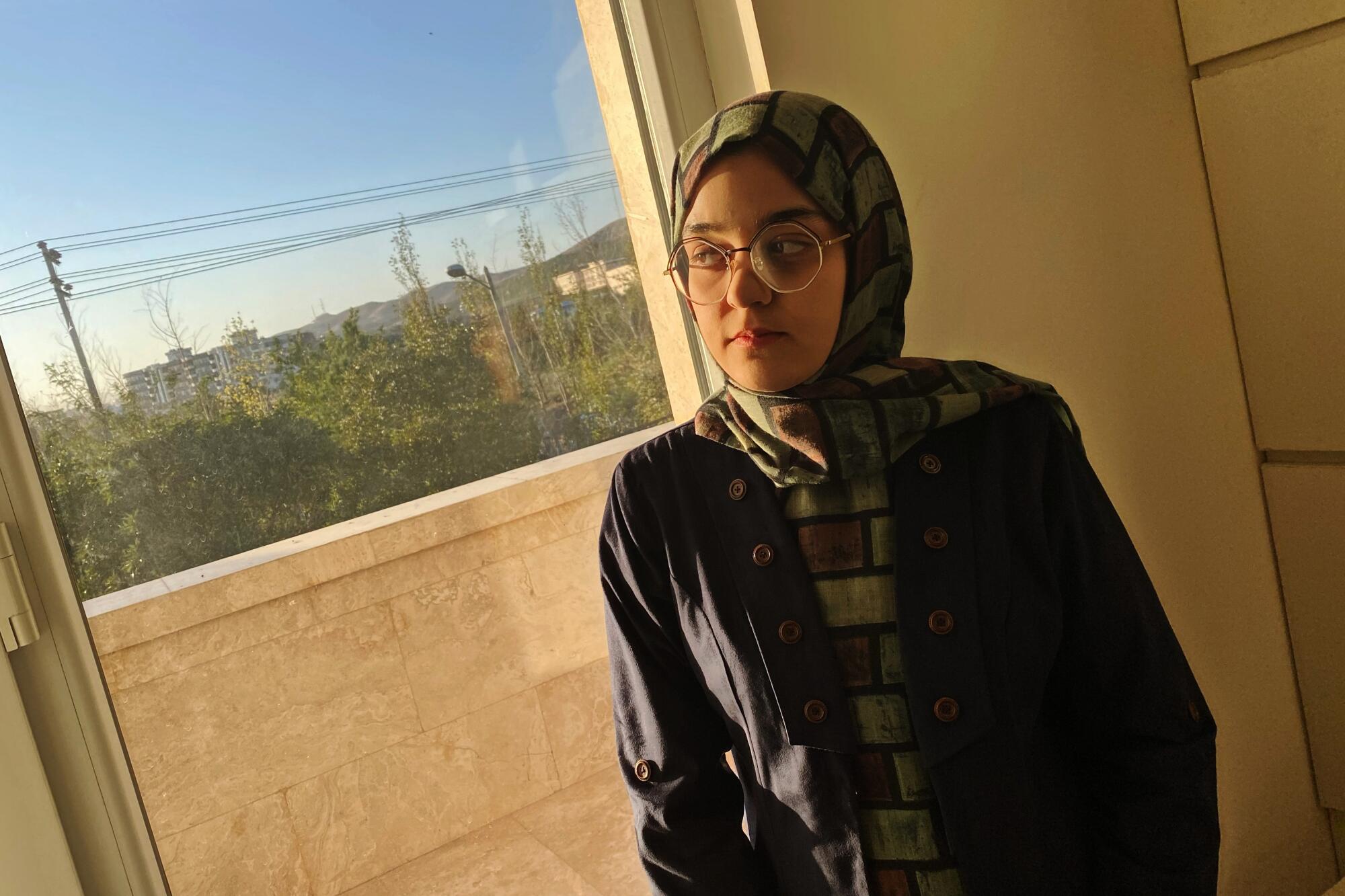
- Share via
KABUL, Afghanistan — Maryam Jami wanted to dedicate her life to helping Afghan refugees, one of the largest groups of displaced people in the world after more than four decades of war.
That ambition led the 23-year-old human rights advocate to apply for a Fulbright scholarship this year to earn a master of laws in the United States, a life-changing opportunity to bring much-needed international legal expertise back to her native Afghanistan.
She was told in April that she was one of only about 100 applicants in Afghanistan named a semifinalist for the prestigious U.S.-funded program. All Jami needed to do was sit for an online interview. Six months later, with her country in disarray and her safety in jeopardy as a woman living under Taliban rule, Jami is still waiting to hear about that interview.
She and many other Afghan Fulbright candidates for the 2022 cohort say they’ve been abandoned by the U.S. after the Taliban’s shocking return to power in August. Officials for the program have provided no updates on the interviews, which were supposed to be conducted in June but were postponed until September. The U.S. blamed the delays on “logistical constraints presented by the COVID pandemic.” With both dates now passed, pleas for answers are growing more desperate as deadlines to apply for U.S. universities and prerequisite exams such as the GMAT and TOEFL will soon expire.
“We are running out of time,” said Jami, who has been spending most days indoors at home in Herat in western Afghanistan to avoid Taliban soldiers and strict restrictions on women’s freedoms. “We’re not receiving any information. We cannot even figure out if anyone is doing anything for us.”
The State Department, which administers the Fulbright program through the Bureau of Educational and Cultural Affairs, declined an interview request. In a statement, it said it was still evaluating the scholarship.
“We are tracking events in Afghanistan closely and are reviewing the future of the Fulbright program,” it said. “We are committed to the aspirations of Afghan students and scholars, and appreciate the continued interest of the semifinalists in study in the United States. We know that this is a challenging time for these Afghan students and their families.”
The Institute of International Education, a nonprofit group headquartered in New York that partners with the State Department to run the Fulbright program, declined to comment.
Some of the semifinalists including Jami have launched a Twitter campaign to draw attention to their plight using the hashtag #SupportAfgFulbrightSemifinalists2022. The official Twitter accounts of the State Department and the Fulbright Program subsequently began following Jami and others on the social media platform.
The Taliban uses force again to disperse protesters, including demonstrators for women’s rights, who are resisting the group’s rule of Afghanistan.
It’s possible the program has fallen victim to the chaos that followed the abrupt departure of American troops and evacuation of U.S. officials. Thousands of Afghans who worked for the U.S. or face persecution from the Taliban have been left behind. The Fulbright program was operated out of the U.S. embassy in Kabul, which was evacuated and relocated to Qatar.
Some Afghan Fulbright applicants said they were told privately by embassy officials that the program could not continue without a memorandum of understanding between the Biden administration and the Taliban. That may be a challenge as long as the U.S. doesn’t formally recognize the new Afghan regime — though it isn’t without precedent. Britain salvaged its international scholarship program, known as the Chevening Scholarships, despite not having diplomatic relations with the Taliban government.
“We don’t know what’s going to happen to Afghanistan in the future, but education should not be affected by politics,” said Hussain Ahmad, a 26-year-old Afghan Fulbright semifinalist looking to study computer science at a university such as Georgia Tech or Cornell so he can help expand internet access in his country.
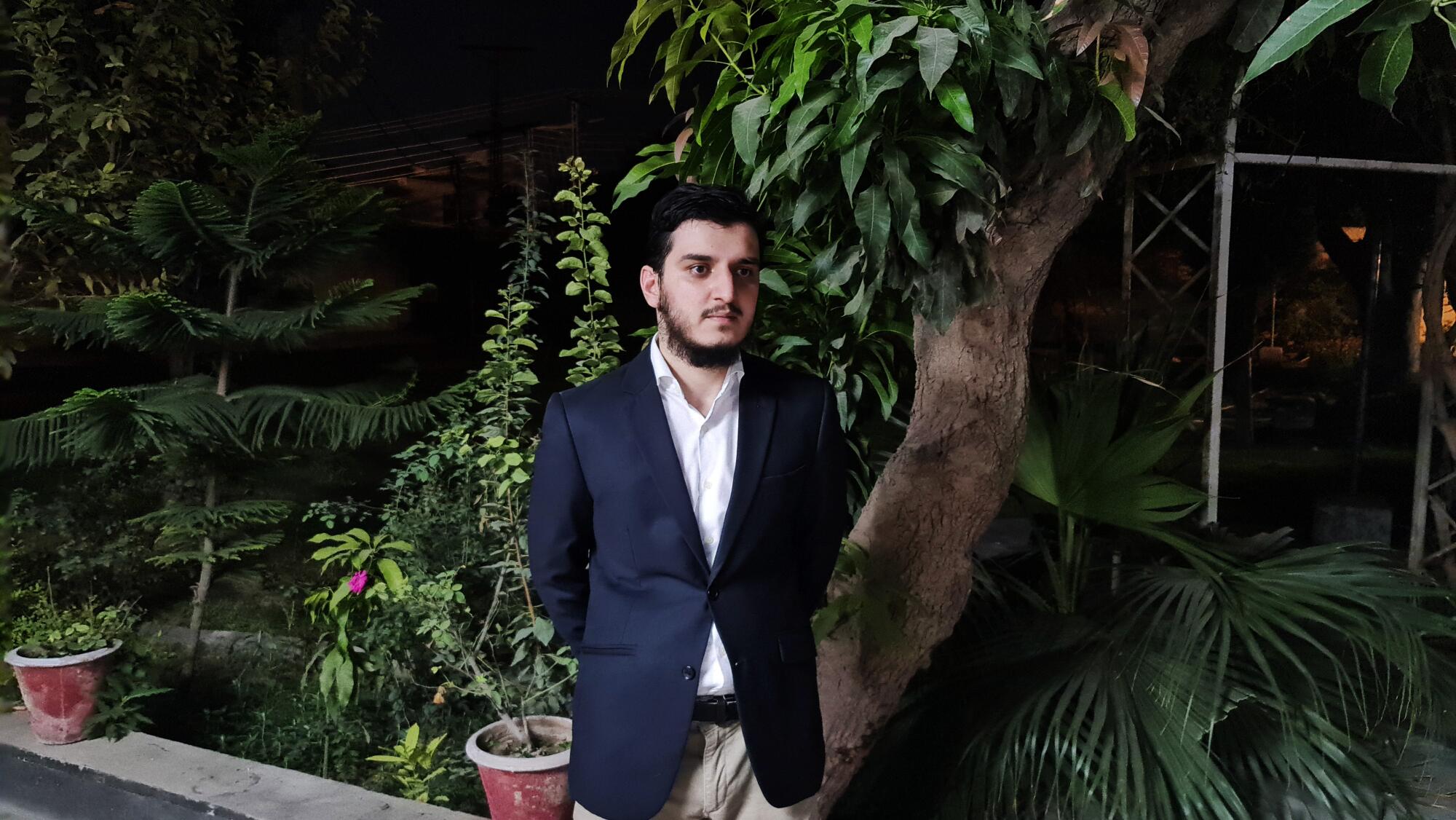
“Fulbrighters should get the opportunity to study in the U.S.A. just like the Chevening scholars in the U.K.,” Ahmad added. “The scholarship was administered before the regime change. They don’t have to kill our dreams.”
It’s unclear how many finalists or alumni evacuated from Afghanistan before the Taliban seized Kabul on Aug. 15. Alumni groups such as the Fulbright Assn. have been calling on the State Department and Congress to ensure the safety of Afghan Fulbrighters and their families. This year’s Fulbright recipients — accepted before the Taliban took power — are on U.S. campuses and include “the largest cohort ever of Fulbright students from Afghanistan,” the State Department said.
Founded in 1946 in the aftermath of World War II to promote peace and closer ties between the U.S. and the rest of the world, the program has minted nearly 400,000 Fulbrighters in 160 countries. Fellows comprise graduate students, teachers, artists and other professionals, and include dozens who have gone on to become heads of state, Nobel laureates and Pulitzer Prize winners.
The program awards about 8,000 scholarships each year, both receiving fellows from overseas and sending Americans abroad.
Although no U.S. recipients are sent to Afghanistan, the Afghans who join the program have long had an outsize influence on the war-torn nation. Many graduates have gone on to serve in high positions of government, including Roya Rahmani, Afghanistan’s first female ambassador to the U.S., and (regrettably to some) former President Ashraf Ghani, who fled Afghanistan in disgrace before its fall to the Taliban.
Taliban fighters rough up two journalists, then seek to make amends by offering water and a sports drink.
Nasir Kaihan was sent to Western Michigan University in 2016 on a Fulbright scholarship to earn a master’s degree in educational leadership. It was a momentous two years that granted him an education that wasn’t available in Afghanistan and allowed him to absorb new cultures and languages and make lifelong friends.
“It was a life-changing experience in every aspect for me,” said Kaihan, who visited 27 states during his time in the U.S. and now works as a project officer for UNESCO. “I have no doubt it would be life-changing for the semifinalists too.”
Kaihan, 34, said the timing was especially frustrating. Being named a semifinalist is a distinct honor and almost guarantees placement in the Fulbright program, if not as a finalist then as an alternate.
“They were on the verge of getting placements,” said Kaihan, 34, who was relocated to Islamabad, Pakistan, and will stay there until the situation stabilizes in Kabul. “They were more than 70% of the way there.”
Closing the program would be especially devastating for female hopefuls who face a new era of discrimination under the ultra-conservative Taliban. The leadership has yet to allow girls past sixth grade to return to school and has blocked access to universities for women until they can be segregated in classrooms from men.
Jami said female friends who were on the cusp of graduating from the law program at her alma mater Herat University will no longer receive their diplomas. Under orders from the Taliban, the women are barred from campus until further notice. The law program, which had spent years trying to garner more international recognition, has been converted to a sharia school.
“It’s really so hard to be a woman,” Jami said. “We’re expected to be robots here; just do what you’re told and cover yourself from head to toe.”
The crackdown on women’s rights has been especially harsh in Herat, the site of the first organized protests in defense of gender equality. The city is home to many of Afghanistan’s leading female activists, who are now being closely monitored by the Taliban, Human Rights Watch reported. Herat is also where the Taliban publicly strung up the bodies of four alleged kidnappers late last month in a display of the militant group’s penchant for brutal justice.
Jami is adjusting to an upended nation, where she’s scared to go outdoors for fear of punishment. The youngest of four sisters, she hopes the Fulbright program will award her a scholarship. She wants to attend Harvard or UC Berkeley to earn a law degree and then return to Afghanistan.
“I’m sure that if the Taliban continues to rule Afghanistan in the coming years it will be just a dream for us to pursue our career goals,” Jami said of Afghan women. “But I won’t give up. Thanks to God there are many international NGOs that would still want to work with us. We can still contribute to this field under the Taliban, even if they won’t permit us to work officially with the government. I can do independent research remotely. That’s why I’m pursuing this degree through the Fulbright program.”
Times staff writers Pierson reported from Singapore and Yam from Kabul. Times staff writer Tracy Wilkinson in Washington contributed to this report.
More to Read
Sign up for Essential California
The most important California stories and recommendations in your inbox every morning.
You may occasionally receive promotional content from the Los Angeles Times.
